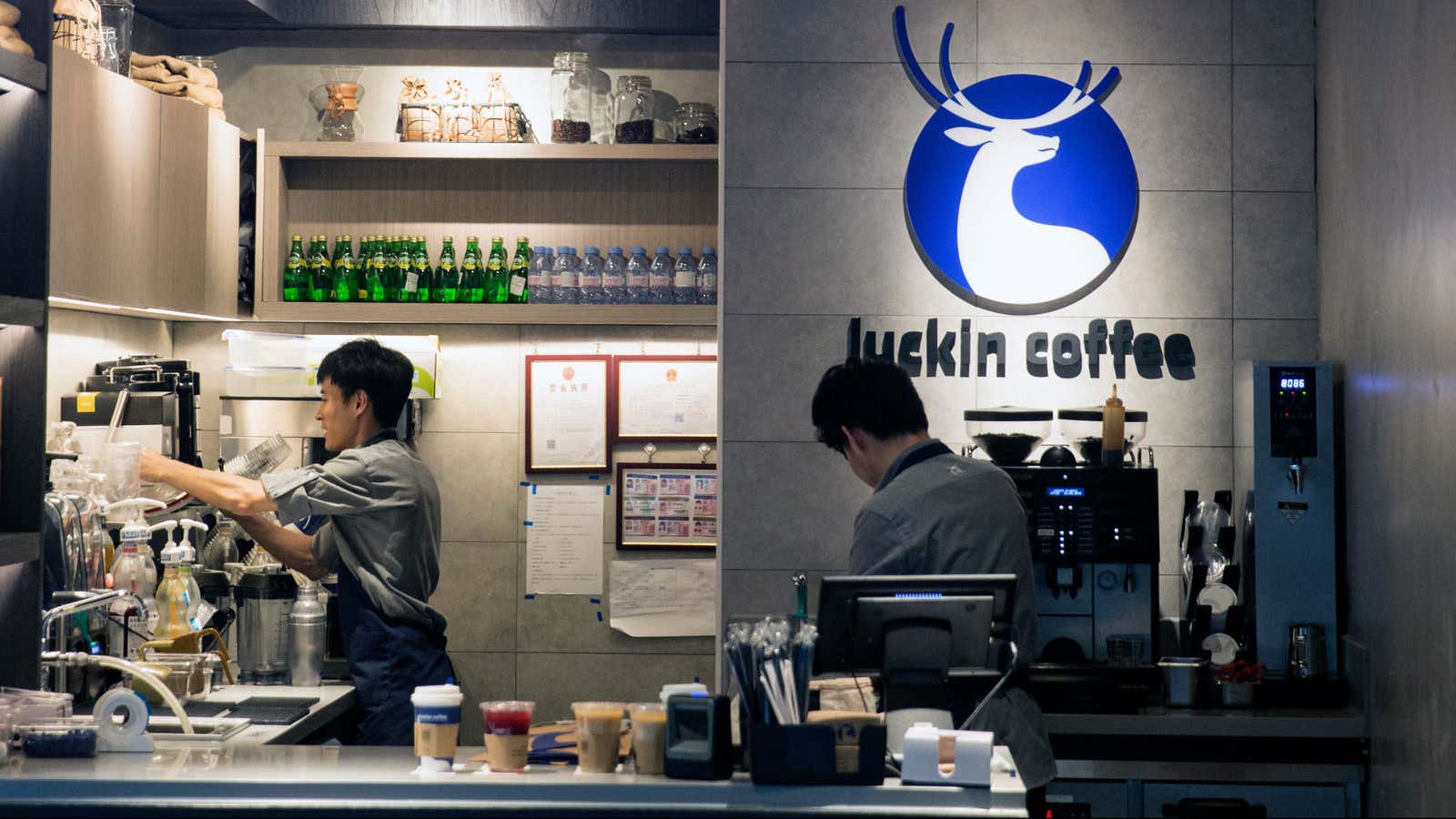Starbucks’ second-largest market after the US is China, where it has over 3,300 stores and operates with virtually no serious competition.
A Beijing-based startup could change that. Luckin Coffee has opened 525 outlets across China’s major cities less than nine months after its launch (link in Chinese). Today the fast-growing company confirmed it’s closed a $200 million funding round giving it a $1 billion valuation. Investors include Centurium Capital, a private equity fund founded by the former China head of Warburg Pincus, and GIC, Singapore’s sovereign wealth fund.
In domestic Chinese media, Luckin has aggressively courted comparisons to the world’s best-known coffee chain. In May, it even wrote an open letter accusing Starbucks of “monopolistic behavior” (Starbucks called the move a “publicity stunt”). But Luckin isn’t a Starbucks copycat—rather, it meshes trends in China’s tech industry with the coffee-shop model mastered by its rival.
First, Luckin Coffee revolves around the smartphone. When customers walk into one of its blue-and-white shops, they’re immediately asked to download the Luckin app to order coffee (assuming they haven’t done so already). They can pay using WeChat payments or Luckin’s own “coffee wallet”—but not cash. This fits into China’s so-called “new retail” trend, in which tech giants like Alibaba and Tencent partner with supermarkets and convenience stores on mobile payments, analytics, and inventory management.
Luckin has also aggressively promoted its delivery services—of its 525 outlets, 231 are kitchens dedicated exclusively to filling orders placed in offices, homes, or elsewhere. This mimics China’s boom in e-commerce and food delivery, which has thrived on the back of low-wage couriers.
When it comes to marketing, Luckin has more in common with a Chinese gadget company than with its Seattle-based coffee rival. Whereas Starbucks typically shuns traditional advertisements, Luckin has plastered China’s cities with billboards featuring popular actors Chang Chen and Tang Wei holding blue-and-white coffee cups. Chinese smartphone makers Oppo, Vivo, and Xiaomi employ similar tactics, using celebrities to pose with products.
Finally, Luckin’s beverages are relatively cheap. In Beijing, a large Americano costs 21 yuan ($3.15), a matcha latte 21 yuan, and a Hawaiian pineapple wrap 9 yuan. That’s roughly 20%-30% lower than comparable items from Starbucks in China (which is more expensive than Starbucks in the US).
Despite the company’s early emphasis on delivery, it insists that bricks-and-mortar retail is the future—a spokesperson tells Quartz the company expects delivery kitchens will make up just 15% of its locations in the future.
But with such low prices and rising expansion costs, can the company justify its valuation and take on the world’s coffee retail giant?
Jeff Towson, who teaches investment at Peking University in Beijing, says that Luckin Coffee is “easily worth $1 billion if it can execute on the business—but that’s a big if.” A large part of Starbucks’ success globally has to do with real estate—many of its stores are placed in expensive, high-traffic locations that rivals can’t afford. Most Luckin outlets are not in such spots, Towson notes. The company uses the app to draw people to less-bustling locations that are cheaper to rent. “It may be that that real estate power can be overcome if you’ve got a really sticky hold on people’s smartphones,” he adds.
